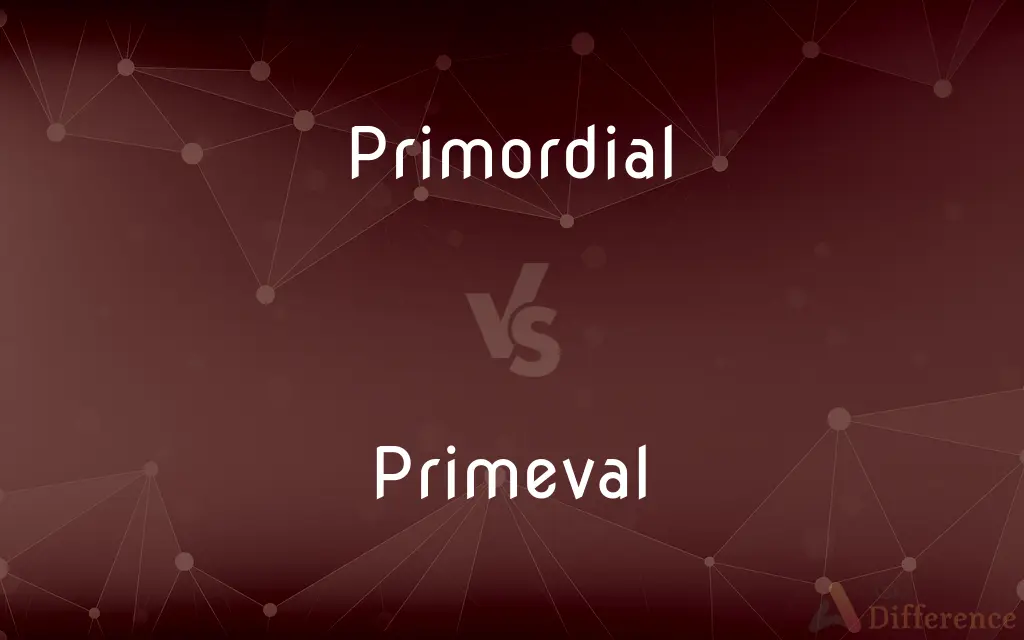Primordial vs. Primeval — What's the Difference?
Edited by Tayyaba Rehman — By Fiza Rafique — Updated on March 7, 2024
Primordial is original or earliest state of something, often related to very beginning of the universe, life. Primeval, on the other hand, denotes something ancient, specifically referring to the earliest ages of the world, implying a wild, untouched.

Difference Between Primordial and Primeval
Table of Contents
ADVERTISEMENT
Key Differences
Primordial is commonly used in contexts that discuss the origins of the universe, such as the "primordial soup" theory in biology, which hypothesizes the mixture of organic compounds in the early Earth's oceans from which life might have originated. Primeval is more frequently used to describe ancient forests, landscapes, or times that evoke a sense of the earth's early, untouched state.
The term "primordial" often carries connotations of fundamental building blocks or original conditions, suggesting something that is intrinsic or essential from the very beginning. "Primeval," however, conveys a sense of ancient past combined with an untouched, pristine quality, often used to describe nature or time periods long before human intervention.
In scientific discourse, "primordial" might be used to describe elements or conditions present from the formation of the universe, such as "primordial gas clouds." "Primeval" could be used in anthropology, history, or literature to evoke an era or environment of early human history or even prehistoric times, characterized by a lack of modern civilization or technology.
The distinction between the two terms also lies in their usage outside of literal contexts. "Primordial" can be used metaphorically to refer to basic, instinctive feelings or forces, while "primeval" might describe something that is perceived as ancient or outdated in a figurative sense.
Comparison Chart
Definition
Referring to the very beginning or original state of something.
Denoting the earliest ages, often with an emphasis on ancient or primitive qualities.
ADVERTISEMENT
Connotation
Fundamental, intrinsic, and often related to origins.
Ancient, untouched, and often evoking a sense of wildness.
Usage
Common in scientific contexts related to the universe or life's origins.
Used to describe ancient times or landscapes, often with a sense of being pristine or pre-civilization.
Examples
Primordial elements, primordial soup theory.
Primeval forests, primeval world.
Metaphorical
Can refer to basic, instinctive forces or feelings.
Might describe something very old or outdated in a figurative sense.
Compare with Definitions
Primordial
Related to the earliest stages of the universe's formation.
Scientists study primordial nucleosynthesis to understand the universe's early moments.
Primeval
Denoting something ancient and no longer present in the modern world.
Primeval beasts such as the mammoth have long been extinct.
Primordial
Characterizing the most basic or primitive stages of development.
Primordial germ cells are essential for the development of reproductive cells.
Primeval
Pertaining to the earliest times or ages, especially before recorded history.
The primeval landscape was untouched by human hands.
Primordial
Existing from the beginning of time; fundamental and original.
The concept of chaos is a primordial aspect of ancient mythologies.
Primeval
Referring to an untouched, pristine state of nature.
The expedition ventured into a dense, primeval forest.
Primordial
Describing basic, instinctual elements inherent to life or existence.
Fear is a primordial emotion crucial for survival.
Primeval
Describing something very ancient or from the earliest age of the world.
The discovery revealed relics from a primeval civilization.
Primordial
Pertaining to conditions or substances from which life is thought to have originated.
The primordial soup is a theory about the origin of life on Earth.
Primeval
Used figuratively to describe something perceived as outdated or ancient.
His ideas on the subject were considered primeval by his contemporaries.
Primordial
Being or happening first in sequence of time; original.
Primeval
Belonging to the first or earliest age or ages; original or ancient
A primeval galaxy.
Primordial
Primary or fundamental
Play a primordial role.
Primeval
Belonging to the first ages.
Primordial
(Biology) Belonging to or characteristic of the earliest stage of development of an organism or a part
Primordial cells.
Primeval
Primary; original.
Primordial
A basic principle.
Primeval
Primitive.
Primordial
First, earliest or original
Primeval
Belonging to the first ages; pristine; original; primitive; primary; as, the primeval innocence of man.
From chaos, and primeval darkness, came Light.
Primordial
(biology) characteristic of the earliest stage of the development of an organism, or relating to a primordium
A primordial leaf; a primordial cell
Primeval
Having existed from the beginning; in an earliest or original stage or state;
Aboriginal forests
Primal eras before the appearance of life on earth
The forest primeval
Primordial matter
Primordial forms of life
Primordial
Primeval
Primordial
Of an element or isotope: occurring primordially (on Earth) (i.e. inherited from when the Earth was formed); because it is stable, or radioactive but so long-lived that some is left over from when the Earth was formed. For example, primordial radioisotopes (T = half-life) include uranium-235 (T = 7×108 years), potassium-40 (T = 1.25×109 years), uranium-238 (T = 4.5×109 years), and thorium-235 (T = 1.4×1010 years).
Primordial
A first principle or element.
Primordial
First in order; primary; original; of earliest origin; as, primordial condition.
Primordial
Of or pertaining to the lowest beds of the Silurian age, corresponding to the Acadian and Potsdam periods in American geology. It is called also Cambrian, and by many geologists is separated from the Silurian.
Primordial
Originally or earliest formed in the growth of an individual or organ; as, a primordial leaf; a primordial cell.
Primordial
A first principle or element.
Primordial
Having existed from the beginning; in an earliest or original stage or state;
Aboriginal forests
Primal eras before the appearance of life on earth
The forest primeval
Primordial matter
Primordial forms of life
Common Curiosities
Can something modern be described as primeval?
Typically, "primeval" describes ancient or untouched qualities, so it's not usually used for modern entities. However, it can be used metaphorically to suggest that something modern is primitive or outdated.
How do primordial and primeval relate to the concept of time?
"Primordial" refers to the very beginning or fundamental state of existence, while "primeval" evokes a sense of the ancient past, particularly before human civilization.
Can primordial and primeval be used interchangeably?
While they share similarities, they are not entirely interchangeable; "primordial" emphasizes the original or fundamental aspect, whereas "primeval" focuses on ancient, often natural, states or times.
Is "primordial" only used in scientific contexts?
Primarily, yes, but it can also be used metaphorically to describe fundamental forces or instincts.
How do scientists study primeval conditions on Earth?
Scientists study primeval conditions through various methods, including geological evidence, fossil records, and the study of ancient climates and ecosystems.
Are there modern examples of primeval environments?
Yes, certain untouched or minimally impacted areas, such as remote forests, wetlands, or islands, can provide modern examples of primeval environments.
Are there primordial elements in nature?
In a scientific sense, primordial elements refer to those present from the formation of the Earth or the universe, like hydrogen and helium found in the early universe.
What does "primordial soup" refer to?
The "primordial soup" theory suggests that life on Earth originated from a mixture of organic compounds in the early Earth's oceans, serving as a fundamental broth for the emergence of life.
Can the term "primeval" apply to human history?
Yes, "primeval" can refer to very early stages of human history or prehistory, often evoking a time when human societies were in their most basic or nascent form.
Do primordial and primeval have any spiritual or philosophical significance?
Yes, in various spiritual and philosophical contexts, these terms can refer to the fundamental nature of existence or the universe's or life's origins.
How does the concept of "primordial" relate to the Big Bang theory?
The concept of "primordial" is closely related to the Big Bang theory as it describes conditions and elements that existed in the very early moments following the universe's inception.
How do "primordial" and "primeval" influence artistic expressions?
These terms can influence artistic expressions by inspiring themes of origins, nature, the fundamental aspects of human existence, and the portrayal of ancient or untouched landscapes and societies.
Is "primordial" used in psychology?
In psychology, "primordial" might be used to describe basic, instinctive thoughts or feelings that are believed to be inherent in all humans from birth.
What is a "primordial galaxy"?
A "primordial galaxy" refers to one of the very first galaxies that formed in the early universe, offering insights into the cosmos's initial development stages.
Can "primeval" describe feelings or emotions?
"Primeval" can describe feelings or emotions in a metaphorical sense, especially when referring to raw, untamed, or deeply ingrained emotional states.
Share Your Discovery

Previous Comparison
Acatalectic vs. Catalectic
Next Comparison
Glow vs. GlewAuthor Spotlight
Written by
Fiza RafiqueFiza Rafique is a skilled content writer at AskDifference.com, where she meticulously refines and enhances written pieces. Drawing from her vast editorial expertise, Fiza ensures clarity, accuracy, and precision in every article. Passionate about language, she continually seeks to elevate the quality of content for readers worldwide.
Edited by
Tayyaba RehmanTayyaba Rehman is a distinguished writer, currently serving as a primary contributor to askdifference.com. As a researcher in semantics and etymology, Tayyaba's passion for the complexity of languages and their distinctions has found a perfect home on the platform. Tayyaba delves into the intricacies of language, distinguishing between commonly confused words and phrases, thereby providing clarity for readers worldwide.















































